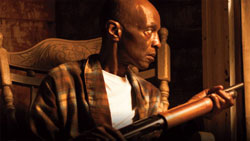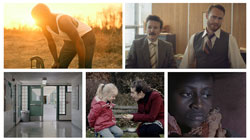Usually when you go to the movie theater you sit down and strap in for the long haul. For about two hours you follow a character’s journey while crying, laughing, or holding your breath.
But can you feel the same way sitting through a film around 20 minutes long?
The task is daunting, but the best short films can make you feel like you’ve experienced a feature length film’s worth of information or emotion.
This year’s Oscar Nominated Live Action Shorts from around the globe features more dramas than comedies, but each touches upon important subjects with messages that will last in one’s heart forever.
The Eleven O’Clock, 13 minutes, Australia
Those who work at psychological services on campus may get a kick out of this one. A psychologist meets with a patient who thinks he is a physcologist.
Director Derin Seale brings the only comedic piece of the bunch. The doctor and patient have a comical spat as they try to prove how the other person is not a psychologist.
When the two argue, it’s difficult to determine who is the doctor.
Each uses the same tricks in the book that psychologists are notorious for like, “what does this word mean to you?” and, “cross-examination.”
Their witty exchange packs in a good amount of laughs while taking a swipe at the profession.
Amidst the heavy material in the other four short films, The Eleven O’Clock is a nice reminder that not all films have to be dramatic for a point to be made.
DeKalb Elementary, 21 minutes, America
Based on true events, director Reed Van Dyk captures any other day in the elementary school’s office: the secretary sits at her desk browsing the web. Mail is delivered and phones are ringing.
Then, everything stops when a heavy-set man walks into the office and pulls out a machine gun.
While in shock, the secretary obeys the shooter’s commands and attempts to reason with him.
The secretary controls the situation extremely well through her calmness. While she talks with the shooter, we view him through a humane lense.
The shooter’s been off his medication and has angst toward the police.
Maybe if we communicate with those who seem to suffer through mental illness or are going through a tough time in their life, it could possibly prevent the loss of others, like the faculty and students at DeKalb Elementary.
From the moment the man whips out his machine gun, the tension will make your eyes widen, your jaw drop and your heart palpitate.
We see these incidents occur daily on the news, but it’s hard to imagine how you’d handle it yourself.
 My Nephew Emmett, 20 Minutes, America
My Nephew Emmett, 20 Minutes, America
Director Kevin Wilson Jr., a graduate student at New York University, transports us to 1955 Money, Mississippi, which is home to the Tills.
For those who unfamiliar with Emmett Till’s tragic story, he was a 14 year old old African American boy who visited his Uncle in Mississippi, but was lynched because of his supposed whistling at a white woman.
Leading up to the horrific event, we follow Emmett’s helpless Uncle.
Once the Uncle gets word of Till’s alleged action, he painfully waits for the inevitable. \
In the heat of the night, two white men take Emmett from his bed, although the Uncle begs to take his place. When he’s thrown into the back of their pickup truck, our hearts break when it drives off into the darkness knowing that Emmett’s mutilated body will be found three days later on the floor of the Tallahatchie River.
The first half of this short film is hard to hear because of the Uncle’s soft dialogue.
However, tension soars when the two white men knock on the Uncle’s door. It’s frustrating to watch the men force themselves in the Till home and abduct Emmett.
A sense of powerlessness not only overcomes the Uncle, but the audience as well.
I wish I could get out of my seat and turn the men away. However, America felt the same way and used this event as a turning point for the Civil Rights movement.
One hundred days following Till’s murder, Rosa Parks would refuse to give up her seat on an Alabama bus.
Watu Wote: All of Us, 20 minutes, Germany
Kenya has endured countless terrorist attacks from Al-Shabaab for the past decade.
A single example comes from 2015, when a bus filled with Muslims and a Christian woman are attacked by terrorists.
In this era where tensions are high between Christians and Muslims, bus passengers unite in the face of terror.
To live in a country where freedom of religion is a natural human right, it’s overwhelming to witness an environment where your belief could cost your life.
Religion divides many in American society, but it’s important to remember that in another part of the world a group of people hijack a faith to kill thousands of their own countrymen and women.
Despite Kenya’s ongoing fight with Al-Shabaab, director Katja Benrath’s gives us hope.
While there are those who abuse religion for hurting people, there are more who use it for selfless service.
Around this time period, Americans were debating religious freedom behind bathroom laws.
Meanwhile, in countries like Kenya, busses need a police escort in case of a terrorist attack to reach their destination across the country.
The Silent Child, 20 minutes, United Kingdom
Over 78 percent of deaf children attend mainstream schools with no specialised support in place and Libby is one of them.
At 4 years old, Libby is a deaf girl who struggles to communicate well with her parents.
The parents call in a social worker, Joanne, who gives Libby a new outlook on the world with the introduction of sign language.
It’s difficult for a hearing family to raise a deaf child, but they must be willing to adjust so their child can live a better life.
Libby’s parents are ignorant towards their child’s disability by assuming she’ll be fine at a mainstream school.
However, children like Libby require special attention early on so they can learn how reach their fullest potential.
We should treat the deaf just like the hearing. Parents of the deaf should be willing to learn sign language to help their child feel like they’re not alone in this silent world.
Deaf actress Marlee Matlin once said, “deaf people can do anything, except hear.”
The five Oscar nominated short films were fantastic this year and each told an important story, but which one was the best?
Find out in next week’s edition of the Outlook, where I will share my Oscar picks and predictions.
IMAGE TAKEN from grandcinema.com
IMAGE TAKEN from drafthouse.com




